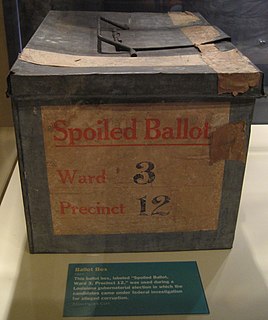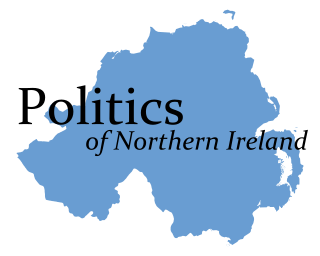
The National Assembly, is the unicameral legislature of Kuwait. The National Assembly meets in Kuwait City. Members are chosen through direct election; the country is divided into five electoral districts with ten members representing each district. There are no official political parties in Kuwait, therefore candidates run as independents during elections; upon winning, members usually form informal parliamentary blocs. The National Assembly is made up of 50 elected members as well as up to 15 appointed government ministers who are ex officio members. On October 16, 2016, the Amir of Kuwait issued a decree dissolving the National Assembly citing security challenges, paving the way for early elections, which were held on November 26, 2016.

A protest vote is a vote cast in an election to demonstrate dissatisfaction with the choice of candidates or the current political system. Protest voting takes a variety of forms and reflects numerous voter motivations, including political alienation.

Herri Batasuna was a far-left Basque nationalist coalition in Spain. It was founded in 1978 and defined itself as abertzale, left-wing, socialist, and supported the independence of the Greater Basque Country. It was refounded as Batasuna in 2001 and subsequently outlawed by the Spanish Supreme Court for being considered the political wing of the terrorist Euskadi Ta Askatasuna (ETA).
Unanimity is agreement by all people in a given situation. Groups may consider unanimous decisions as a sign of e.g. social, political or procedural agreement, solidarity, and unity. Unanimity may be assumed explicitly after an unanimous vote or implicitly by a lack of objections. It does not necessarily mean uniformity and can sometimes be the opposite of majority in terms of outcomes.

Elections in Portugal gives information on election and election results in Portugal.

Elections in Nicaragua gives information on elections and election results in Nicaragua.

Elections in Northern Ireland are held on a regular basis to local councils, the Northern Ireland Assembly, the Parliament of the United Kingdom, and to the European Parliament.

The Northern Ireland Assembly established in 1982 represented an ultimately unsuccessful attempt to restore the devolution to Northern Ireland which had been suspended 10 years previously. The Assembly was abolished in 1986.

The Government of the Republic of Abkhazia governs the partially recognised Republic of Abkhazia.

South Africa held national and provincial elections to elect a new National Assembly as well as the provincial legislature in each province on 22 April 2009.
An election boycott is the boycotting of an election by a group of voters, each of whom abstains from voting.

The 2005 United Nations Security Council election was held on 10 October 2005 during the 60th session of the United Nations General Assembly, held at United Nations Headquarters in New York City. The elections were for five non-permanent seats on the UN Security Council for two-year mandates commencing on 1 January 2006. The countries elected were the Republic of the Congo, Ghana, Peru, Qatar, and Slovakia.

The 2002 United Nations Security Council election was held on 27 September 2002 at United Nations Headquarters in New York City during the 57th session of the United Nations General Assembly. The General Assembly elected five non-permanent members of the UN Security Council for two-year terms commencing on 1 January 2003.

The 2000 United Nations Security Council election was held on 10 October 2000 at United Nations Headquarters in New York City during the 55th session of the United Nations General Assembly. The General Assembly elected five non-permanent members of the UN Security Council for two-year terms commencing on 1 January 2001.
The Prosecutor of the International Criminal Court is the officer of the International Criminal Court whose duties include the investigation and prosecution of the crimes under the jurisdiction of the International Criminal Court, namely genocide, crimes against humanity and war crimes as well as the crime of aggression once that crime comes under the Court's jurisdiction which will not be the case before 2017.

The Portuguese constitutional referendum was held on 19 March 1933. A draft of the Constitution had been published one year before and the public was invited to state any objections in the press. These tended to stay in the realm of generalities and only a handful of people, less than 6,000, voted against the new constitution. With its passage, women were allowed to vote for the first time in Portugal and given a voice in the National Assembly. Secondary education was a requirement for women suffrage, while men needed only to be able to read and write.

Galiza Ceibe-OLN was an independentist and socialist political party in Galicia, Spain. Galiza Ceibe was founded on 1980 by the Galician Party of the Proletariat as a political and electoral front, originally to present a list in Vigo and in other galician municipalities under the name Agrupación Electoral Galicia Ceibe in the 1979 local elections.
An indirect presidential election was held to choose the President of the United Nations General Assembly on 13 June 2016 to replace Mogens Lykketoft and preside over the Seventy-first session of the United Nations General Assembly. It was the rotational turn of the Asia-Pacific Group to preside over the session. Peter Thomson was elected with 94 votes for and 90 votes against. This was the first time since 2012 that there was no consensus candidate from the regional groupings, thus invoking a secret ballot vote. His tenure begins on 13 September 2016.
This page is based on this
Wikipedia article Text is available under the
CC BY-SA 4.0 license; additional terms may apply.
Images, videos and audio are available under their respective licenses.













